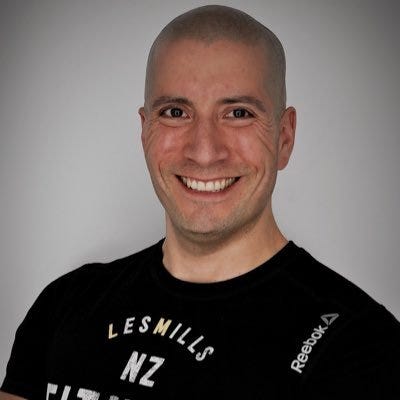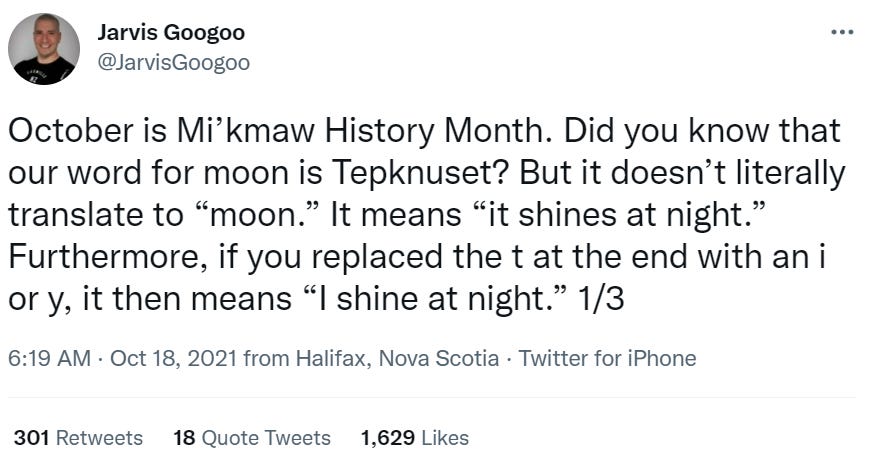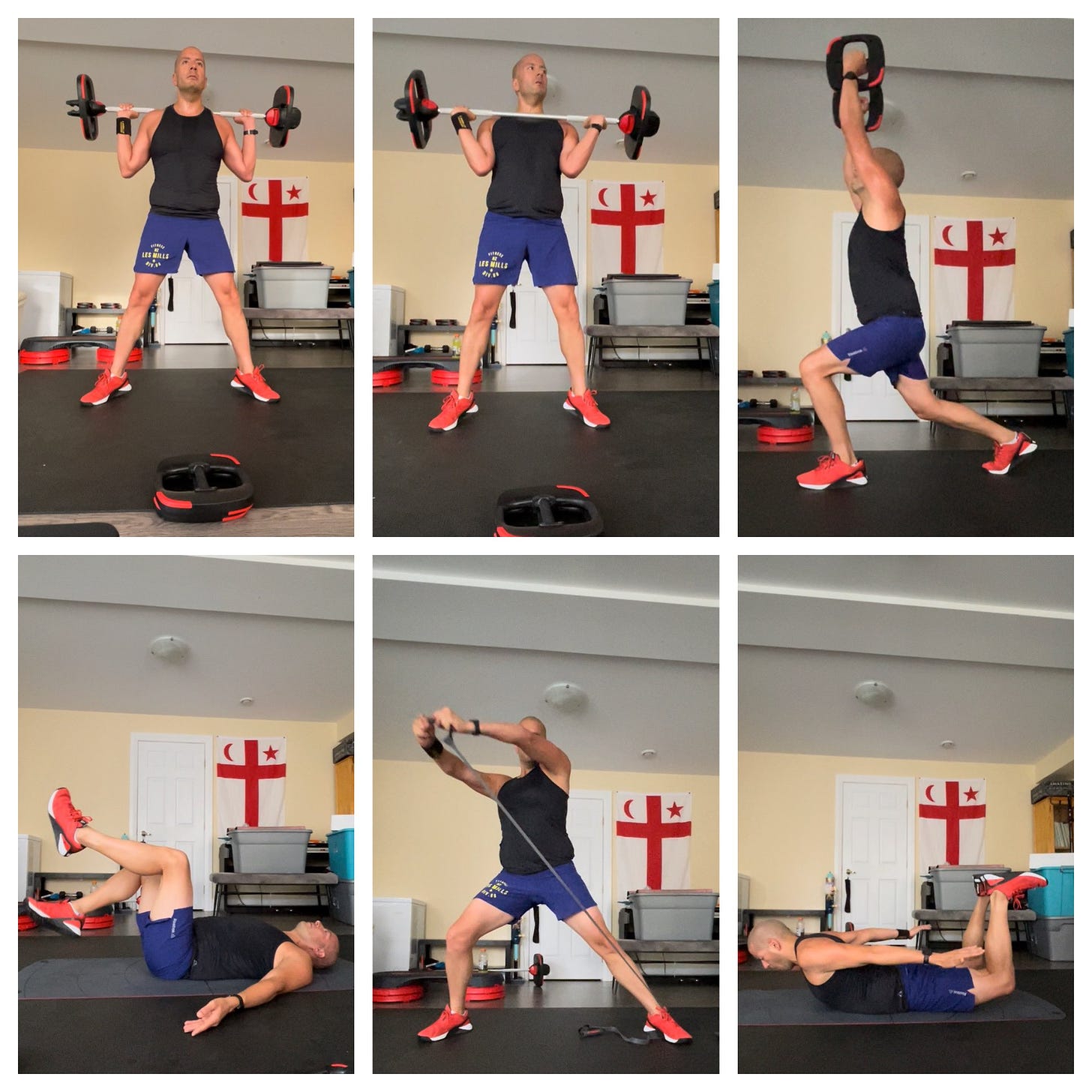How About This Presents Jarvis Googoo
Featuring a passionate Indigenous communicator and athlete
Welcome to Atlantic Canada Mondays, a regular feature of How About This where we interview interesting residents of the Canadian provinces of New Brunswick, Nova Scotia, Prince Edward Island and Newfoundland and Labrador. This week I’m very pleased to feature Jarvis Googoo (Jarvis Googoo on Twitter).
From his website’s About section:
Jarvis was raised in We’koqma’q, Unama’kik, attended an Indian Day School, and graduated from a Mi’kmaw Kina’matnewey school. He holds degrees from Saint Mary’s University (cum laude), Dalhousie Law School, and is a non-practicing member of the Nova Scotia Barristers’ Society.
He has spoken and presented on Mi’kmaw history and culture, Peace and Friendship, and Truth and Reconciliation to numerous audiences. These include Dalhousie Law School and Medical School, the Nova Scotia Physiotherapy Association, churches, schools, Girl Guides of Canada and Scouts Canada, and to regional and national media outlets.
And now, onto the interview!
1. When I contacted you for this interview you responded with the greeting "Kwe Mark", which translates appropriately enough to "Hello Mark". Is this the greeting you commonly use with everyone or do you only use it in certain situations?
If someone reaches out to me in a personal capacity, or looking for a Mi’kmaw speaker/perspective, I tend to use it.
2. I found your Indigenous History Month Twitter posts very informative (Tepknuset!). What led you to start posting these? What has the response been like?
I started it in October 2016 (October is Mi’kmaw History Month in Nova Scotia). Then in June 2021, after the confirmation of childrens’ bodies at the site of the Kamloops Indian Residential School, there seemed to be a keenness of folks to want to learn more re Indigenous history, so I used a lot of my October 2016 trivia tweets, and then did this again in October 2021 and June 2022. A lot of it repeats as I gain new followers and don’t want them to miss out.
Reception has seemed to be overwhelmingly positive, and I am only happy to continue it.
3. I won't ask details about your Day School experience (the dates shocked me, but I remembered that some of the schools remained open until the 90s) but I do wonder how you process it. Is it something that you would try to cope with using traditional techniques from your Indigenous heritage or do you use other methods?
After I did my personal narrative for my settlement claim, I did reach out to Hope For Wellness to talk to someone as I spent a full day going over what I went though. One coping mechanism I still commonly use is talking to former fellow Indian Day Schools students that I went to school with. Often we chat/discuss some of the abuses that we went through or witnessed.
For me, I find when I can open up with others (who open up to me), discussing things can hurt, but at the same time, right after, you do feel better about getting things off of your chest. Obviously some others don’t wish to get into detail about it and that’s perfectly fine.
4. Perhaps the previous question leads naturally to this one, but can you tell us about what started your running practice?
I actually did run for years in the mid-1990s until early 2000s. I did the 5000M in Track and Field in grade 12 and did very badly at the regionals. Then I pretty much stopped for a while.
Then in December 2015, my friend Erica asked me to come along for a run with her and so I did. During the run, she said that I should try a race. Given my track record (emphasis on the pun), I said that I would, but only stay with her and not race it per se. So we signed up for the Blue Nose 10K for May 2016. We started together, but about 40 seconds in, I said that I was leaving her (which she supported), took off, and after the race, I started looking for more to do.
5. How would you describe the emotional experience of running the Boston Marathon (and much respect, by the way)? Would you do it again?
It was incredible. Many experienced Boston Marathoners told me that you do Boston for the experience; not a personal best. The crowd’s energy was amazing, and so was the support from back home.
I would do Boston again, but not for a few years. I want to do other marathons elsewhere first, but would like to return to Boston one day.
6. What are your general feelings about Twitter, you've been using it for more than 10 years - good/bad/indifferent?
For me, I love Twitter. I enjoy it much more than The Facebook (where I don’t post as much anymore). Mainly, I find Twitter is a great way to get info/thoughts out in the public (I’m iffy on some privacy issues re The Facebook), and folks have great questions/comments on Mi’kmaw trivia that I post.
7. How do you feel about the current state of Nova Scotia?
From my observations and perspective, progress is coming along. Just last year, we had a welcome sign written in Mi’kmaw installed at the entrance of the Canso Causeway. This year, Mi’kmaw language is being recognized by the province as Nova Scotia’s First Language.
So to me, progress is being made (which I’m very pleased with), but like anything, more needs to be done.
Respecting Mi’kmaw fishers re their rights to fish for a moderate livelihood needs to improve.
8. How do you feel about the current state of Canada?
As per the previous question, I feel the same. Last year, as per the Truth and Reconciliation Commission’s Call to Action, September 30 became a statutory holiday to honour Survivors (and those who didn’t make it home), and to have Canadians reflect upon and learn from the Indian Residential School’s legacy. It seemed after Spring 2021, Canadians wanted to learn and do more re Indigenous history.
I do see progress, but I also see that more needs to continue to be done. It’ll take a long time to undo centuries of colonialism. It won’t happen in just a few years.
9. Is the government doing enough to protect us from COVID 19? Have we become too lax in our approach to the coronavirus or do we have the right tools, if not the wisdom or will?
For me, I continue to wear a mask indoors and limit my social gatherings. COVID is still here. I caught it last month (June 2022) and immediately self-isolated until cleared. I understand that this is now only suggested. This worries me as while I’m healthy, those who are immune compromised, elderly, and or unhealthy may be at risk of severe symptoms or worse.
I think it’s important to remember those who are at high-risk when it comes to our safety precautions, and to take proper measures to try and prevent them from catching COVID.
10. Pretend you wake up one morning and the Internet has been destroyed. What the first thing that you do?
Live as if it’s the 1990s all over again (I virtually didn’t use the internet until I moved to the city and started university in 2000).
Bonus question: do you have anything you'd like to share with our readers? If so, please feel free to.
I probably have odd/different interests/hobbies
I love Friday the 13th, zombie films, horror
Am a casual gamer (was a diehard one growing up)
First career aspiration was to be a pro wrestler (I did apply to four schools in North America and was accepted into one in Virginia)
I can rewatch any episode of The Simpsons and Seinfeld and still laugh
I find lawn mowing joyful and peaceful.
Thanks to Jarvis for taking part in this interview!











That was an interesting interview Mark! Would love to hear more stories from the First Nations people of Canada. Perhaps someone doing language revitalization work? :) That's a super interesting topic.
Great interview!